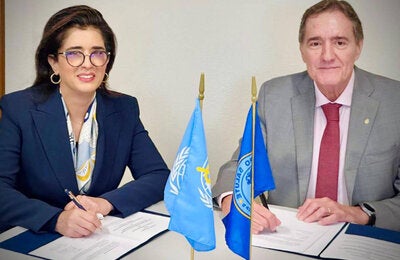Miragoâne, Haiti, 11 October 2018—In order to support the Haitian Ministry of Health (MoH) in reducing maternal and neonatal deaths, PAHO/WHO assists the Health Departmental of Nippes (DSNi) in improving the quality of health care through capacity building and training for the health workers.
Health workers including nurses, midwives and doctors, all from healthcare institutions of the Nippes, participate in Management of Labor and Delivery (GESTA) trainings dedicated to reducing maternal and neonatal death. The trainings are offered to maternal, neonatal infant and adolescent health professionals of the Health Department of the Nippes, Haiti. To date, 35 health workers have taken part in the trainings. This includes 27 nurses, 5 midwives and 4 doctors.
These trainings are provided by the Haitian Society of Obstetrics and Gynecology (HSOG) with the financial support of PAHO/WHO and a grant from the Canadian government. The trainings are funded by Global Affairs Canada (GAC) under the IHSLAC Project, a collaboration agreement between PAHO and GAC.
The objective of these trainings in Miragoâne is to assess, update and maintain health professionals’ abilities in pre and postnatal care, in order for them to understand how to improve the progress and the outcome of immediate intrapartum and post-partum care, and to allow experience sharing between participants.
The GESTA trainings aim to improve the health status of women and newborns by promoting knowledge of caregivers and decision-makers with respect to sexual rights for women and to better inform advocacy and health programs. This approach combined with improvement in the quality of obstetrical care, tries to contribute to the reduction of unwanted pregnancies and delivery related mortality and morbidity.
The courses are based on factual, theoretical and practical medicine, and focus on the study of the five principal causes of maternal mortality and morbidity including i) hemorrhage; ii) infection; iii) hypertensive disorders; iv) prolonged or obstructed labor; and v) risky abortion. In addition, the GESTA courses promote evidence-based care for neonatal health. Courses include a module on neonatal resuscitation and on daily care of newborns. By promoting rights to sexual and reproductive health, these courses make participants sensitive to social, economic, cultural and legal factors that limit women’s access to health information and services. In addition, the course introduces participants to maternal death audits and methodologies based on the guidelines developed by WHO. The courses also expose participants to monitoring and evaluation approaches necessary for any initiative aimed at improving the quality and the accessibility of neonatal and maternal health services.
The aim of the PAHO/WHO Office is that by the end of these trainings, health professionals in maternal, neonatal, infantile and adolescent health will acquire adequate knowledge, technical abilities, as well as team work and communication skills that will serve them well in delivery rooms. In this way, these trainings will contribute to improve the quality of services offered to pregnant women and newborns.
For Further Information please contact:
- Dr KOBI-JACKSON Solange (FPL Coordinator/HAI) at kobijasol@paho.org
- Dr ILOKO F. Maximilien (MMR advisor/HAI) at ilokofmax@paho.org
- FAUSIER Melissa (FPL administrative assistant/HAI) at fausierm@paho.org



